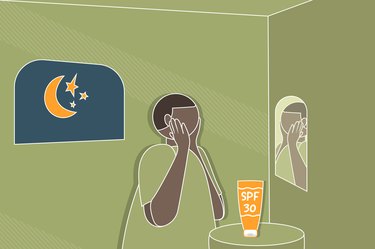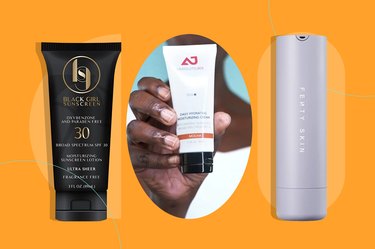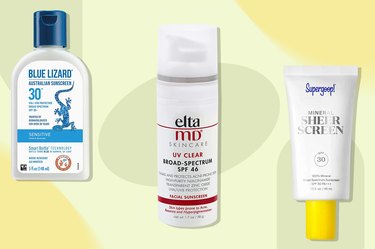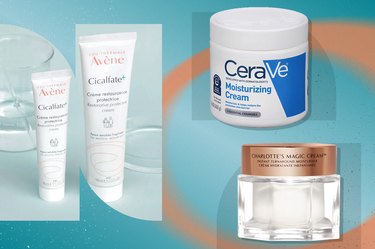
There's no shortage of moisturizers on the market, which is why it can feel like hitting the jackpot when you land on a product you love. But if your beloved lotion also contains SPF, should you be slathering it on at night as well as during the day? In other words: Is it bad to sleep with sunscreen on?
We spoke to three board-certified dermatologists to learn if you should put on sunscreen at night. Here's what they had to say.
Video of the Day
Pros of Wearing SPF at Night
There are a couple of factors to bear in mind when deciding if your SPF moisturizer should pull 24-hour duty. Here are some of the possible advantages to wearing sunscreen at night:
1. It May Protect Against Photodamage
Sun isn't the only thing that can damage your skin.
"There are some newer studies that show that fluorescent lights and even some of the lights from your computer can possibly contribute to photoaging," says Suzanne Friedler, MD, FAAD, board-certified fellow at the American Academy of Dermatology.
For instance, a December 2018 study in the Journal of Biomedical Physics and Engineering found exposure to blue light from screens can increase oxidative stress on your skin, which could potentially cause cell damage and wrinkles.
As a result, wearing SPF at night may offer some protection if you're exposed to these indoor rays. Dr. Friedler recommends moisturizers that contain physical blockers like titanium oxide and zinc dioxide (mineral-based sunscreens) for the best protection against fluorescent and blue light.
However, "there needs to be more research about how the blue lights and fluorescent lights from our devices affect us," Dr. Friedler says. For now: "If you're exposed to those conditions at night, there may be some added benefit [to wearing SPF]."
Assessing Photodamage Risk
According to Yale Medicine, dermatologists use the Fitzpatrick’s Scale to determine skin’s phototype (or skin color) and photodamage risk. For reference, Type 1 skin is more susceptible to photoaging and skin cancer than Type VI.
Here's the breakdown:
- Type 1: Pale skin, light-colored eyes, blond or red hair. Always burns, does not tan.
- Type II: Fair skin with light-colored eyes. Burns easily but may tan.
- Type III: Medium light skin that initially burns and then tans
- Type IV: Light brown skin that tans with minimal burning
- Type V: Medium brown skin that rarely burns
- Type VI: Dark brown or black skin that tans easily and never burns
2. It May Protect Against Melasma
Sunburn isn't the only way rays can harm your skin — sun, fluorescent and blue light exposure can also contribute to a condition called melasma, which causes uneven dark patches, per Yale Medicine. Melasma is more common among people with darker skin.
"For patients with darker skin tones or melasma, this is where the all-day SPF can play a role," Dr. Friedler says. "If you have really bad melasma, some of those fluorescent and blue lights may contribute to it to some degree."
And wearing SPF may block those indoor rays from causing further damage.
A Con of Wearing SPF at Night
The biggest potential drawback to putting on sunscreen at night is It simply doesn't have much added benefit. When it comes down to it, there's really just no reason you should wear sunscreen to bed.
"I don't think there is a disadvantage to [using SPF lotion before bed], but I don't think there is any added benefit to it," Dr. Friedler says. "The purpose of sunscreen-based lotions is to block out UVA and UVB rays, both of which cause photodamage, pigmentation, wrinkling, aging of the skin and premature cancers. If you're putting it on at night when there isn't much UV around, you're just not getting that added benefit."
That said, if you find your SPF lotion provides the best hydration, Dr. Friedler says, "it's better to moisturize than not to."
Dermatologist-Recommended Alternatives
It isn't necessarily bad to sleep with sunscreen on. But in most cases, it's unnecessary. Instead, it may be wiser to use bedtime as an opportunity to nourish your skin in other ways.
Choose a nightly moisturizer based on your skin-care goals and skin type, says Elizabeth Bahar Houshmand, MD, a double-board-certified dermatologist. For instance, if you're concerned about hyperpigmentation, pick a moisturizer that targets the condition. If acne is an issue, choose a lotion designed for pimple-prone skin.
In general, though, "a night cream should have different ingredients and consistency than a day cream," she says. "Night creams are usually thicker and contain ingredients designed to moisturize and repair damage to your skin."
Ideally, moisturizers should be fragrance-free, adds Mary L. Stevenson, MD, assistant professor at the NYU Langone Medical Center.
Drs. Stevenson and Houshmand recommend considering lotions that contain the following ingredients, depending on your skin type and concerns:
- Lipids: Compounds that mimic your natural skin barrier
- Ceramides: Types of fats or lipids that mimic your natural skin barrier
- Niacinamide: A form of vitamin B3 that can help brighten skin and calm redness
- Peptides: Amino acids that can support collagen and elastin production
- Antioxidants: Substances that can decrease free radicals that cause skin damage
- Retinol: A form of vitamin A that can help with fine lines, wrinkles and dark spots
- Alpha- and beta-hydroxy acids: Substances that can improve skin dullness, provide exfoliation and help night cream reach deeper layers of your skin
Tip
There are lots of moisturizers and other products to pick from — talk to your dermatologist to determine the best options for your skin type and concerns.
So, How Bad Is It Really to Use Sunscreen at Night?
In short, no, it is not bad to sleep with sunscreen on — it's just probably not necessary.
When it comes to SPF, what's most important is that you wear it during the day. "The key message with sunscreen is starting with a high number — SPF 50 or higher — and reapplying every two hours during the day when you're outdoors," Dr. Friedler says.
"If you choose to use it in the evenings while indoors, it may give you that added protection against fluorescent lights and blue lights," she says. "But you have to choose one that contains a physical blocker like a micronized titanium oxide and zinc oxide."
But if fluorescent and blue light isn't a concern, or if there are more pressing matters to take care of — like acne, skin discoloration or scarring — you're likely better off selecting a nighttime moisturizer that specifically addresses those issues rather than slathering on the SPF.
And don't forget, if you wore sunscreen all day (dermatologist-approved!) it's important to wash it off your face at night — along with any other makeup, dirt or debris that collected there during the course of your day, according to the American Academy of Dermatology Association.
Is this an emergency? If you are experiencing serious medical symptoms, please see the National Library of Medicine’s list of signs you need emergency medical attention or call 911.






